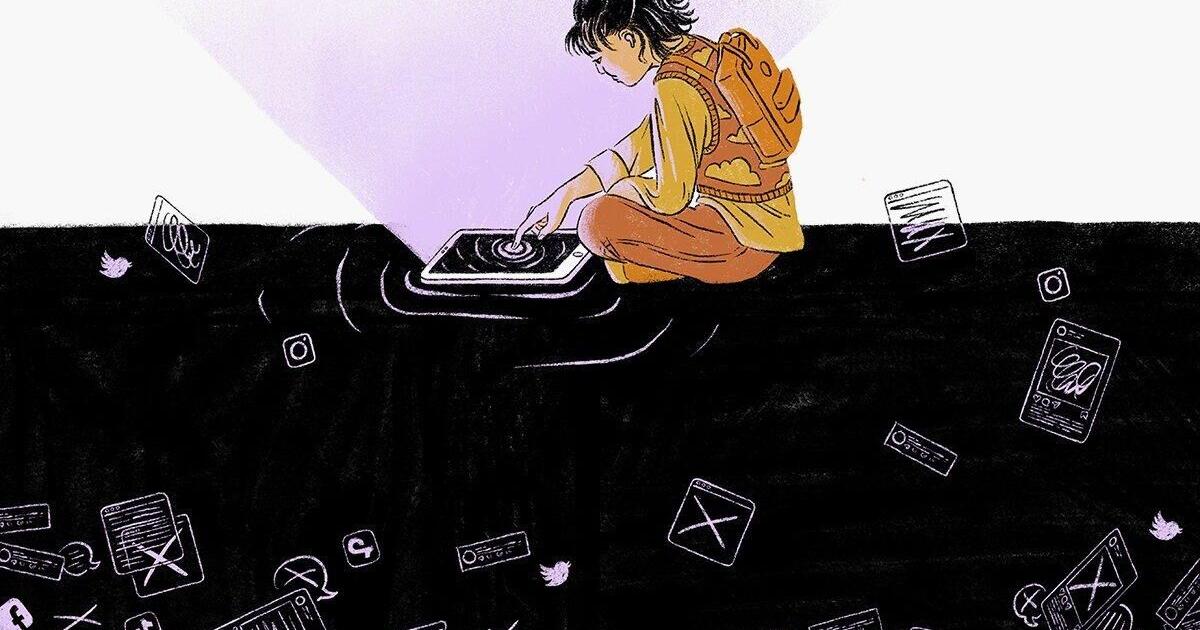They’ve grown up online. So why are our kids not better at detecting misinformation?::Recent studies have shown teens are more susceptible than adults. It’s a problem researchers, teachers and parents are only beginning to understand.
Because on one side you have a kid and on the other side you have hordes of psychologists paid millions for devising better ways to trick them into clicking.
Calling them psychologists is giving them too much credit, but you’re right that the companies trying to trick them are putting tons of resources into it.
Very often this shit is designed by people with psychology degrees.
I thought marketing and media people generally have communication degrees.
User researcher is a job that’s becoming more common at tech firms, and usually requires a psychology degree or similar
You don’t need a full penetration of psychology degrees, just a sufficient amount.
The specific field is marketing psychology, it’s a subset of industrial-organizational (I-O) psychology.
I’m not going to mention the company I work for, but I can verify that psychology is being used to advertise to kids. Mass manufactured food industry.
They will pick out very specific colours, mascot attributes, shapes and more to draw kids attention.
I shit you not, there’s a certain cookie brand with a happy bear on the box that has eyes that look upwards. The entire purpose of this is to subconsciously make kids think that they’re making eye contact with the happy mascot, so they’ll trust it more. Certain colours are also believed to trigger more hunger in consumers. They play on so many factors in advertising that it isn’t funny.
This is just one example, but this is definitely a thing that is happening in many companies.
Social engineers?
The serious stuff is increasingly nation states, and there are for sure psychologists involved in that.
The influence operation was the seventh from China that Meta has removed in the last six years. Four of them were found in the last year, said the company, which published details of the new operation as part of a quarterly security report.
The effort appeared to “learn and mimic” Russian-style influence operations, Meta said. It also appeared aimed at a broad audience. At times, posts were in Chinese on websites such as the Chinese financial forum Nanyangmoney. At other times, posts were in Russian, German, French, Korean, Thai and Welsh on sites such as Facebook and Instagram, which are banned in China.
Not to mention they’re kids… you know, with limited life experience compared to adults.
A big part of detecting bullshit is having the experience of getting burned by bullshit.
Not necessarily. People keep being burned by the same scams over and over.
Sure but if you take a population of people and expose them to the same scam over and over; in theory less will fall for it each time. Some might fall for it every time to infinity, but < 100% of those who failed on round one will.
this just in: kids are worse than adults at stuff! wow!
This^
Because media litteracy and critical thinking are not subjects taught being taught in schools.
Inquisitive and skeptical minds do not make for good worker drones.
I’m a teacher. This is very false. The issue is that being taught in schools and being learned in schools are completely different things. Between No Child Left Behind and IDEA, schools are being incentivized to graduate students regardless of the learning done in the school.
I know for a fact that these skills are taught in 6-8th grade social studies classes, as well as digital literacy classes. Hell, I teach 2 classes that are entirely based around critical thinking.
It also doesn’t help that we literally have decades worth of media indoctrinating kids (now parents) into thinking “teachers don’t teach you anything useful”. How many nicklelodean kid sitcoms involved mean teachers who “don’t even understand what they are teaching?”
I don’t know what current kid shows are teaching. But I know my sister’s husband very much likes to “make jokes” about his kids’ teachers to them. I do what I can when I visit but I can already see them shifting from “Wow, school is cool… why is everyone staring at me?” to “Ugh. I hate having to do homework. I am never going to use any of this in real life”.
This isn’t helped by the fact that in many school districts it isn’t possible to hold a child back. We literally have students entering high school that haven’t done anything since 3rd grade but have been advanced to the next grade anyways. Then we get surprised Pikachu face when they can’t do the things they need to graduate.
That actually ignores the whole “make up credit” classes where answers to every question are literally a google search away.
I literally had a student in one of my math classes who pasted a “couldn’t find results for…” as an answer to a homework question because they had mistyped the question.
Curious: What is the root cause of students/less intelligent people like this? Poor upbringing? Genetics? Effort? Somewhere down the line there’s a cause.
There’s no motivation to do the work. Students that work hard get a diploma. Students that don’t do anything…still get a diploma.
We have students who can barely read and can’t do basic math, but they still get a diploma. Why do work for the same result?
How many nicklelodean kid sitcoms involved mean teachers who “don’t even understand what they are teaching?”
I don’t know, how many?
My experience as a parent:
It has nothing to do with education. It had nothing to do with knowledge.
It has everything to do with trust. They trust youtube/insta/Tiktok. They trust the influencers.
This is nothing new or exclusive to kids. Don’t believe me? The antivax movement. You know: “educate yourself.” That. Grownups are not immune.
This is nothing new.
Quality education is locked behind a very expensive paywall.
I went to a public high school in the renaissance of MySpace and Angelfire and Geocities. My Current Events class was entirely breaking down political speech and recognizing the undercurrents. World History was as much about what happened but also how the situation developed, including a stint on understanding modern journalism through the development of Yellow Journalism.
Public school can do exceptionally well if it’s actually funded like it’s supposed to be.
deleted by creator
per 2022? A little over $58k, so definitely not bananas
I think you mostly get out of education what you put into it. You don’t need a ton of resources to educate someone who is intelligent, wants to learn, and is willing to put in time and effort.
If someone doesn’t care or isn’t interested, more money allows for more resources to be allocated to working with that individual. More resources may improve that person’s education compared to what it would have been without those resources, but it doesn’t necessarily mean that their education is superior in quality relative to others because it consumed more resources.
I think it’s less that “media literacy is not taught” but that media literacy is not learned. Like @audiomodder said, everyone is graduated regardless. So, on one hand, there are students who either will not or cannot learn the material (for one reason or another, such as disability, stress, family, etc.) and teachers who get a laundry list of things to teach and not enough time or support to teach it.
Ultimately, the problem is a lack of focus on education as a society. Children are pulled in too many directions, and teachers aren’t given the resources needed, so we end up with a broken educational system.
Blue state or red state?
Very red.
I had a class in 2nd grade back in like 2002 that taught us about how to spot fake websites, what TLDs meant, and witch ones we could probably trust. One of the examples was a fake site made either as a joke or for these kinds of lectures about tree squids. It was photoshopped octopuses high up in a tree. As with everything in the education system, it’s not that theyre not being taught these skills, the students are not interested in learning them. There are classes that taught me things that people who sat next to me in those classes denied beging taught.
Have you talked to a parent or child recently about current grade school? Tech literacy education has basically vanished, at least in US public schools. They pretty much expect kids to have figured out tech literacy in their own time, since computers and smartphones are so ubiquitous now.
I, too, had classes like what you described when I was in grade school, in addition to typing and Microsoft Office classes. The school I went to doesn’t have any of that anymore, just a couple carts full of Chromebooks that the students share for writing papers.
Considering I learned how to type from playing RuneScape, not from the 4 separate typing classes they put us through, I don’t really think most students would learn tech literacy from public education if they teach I or not. Look at the people complaining that no one taught them how to do their taxes dispute the mathematics required do your taxes being taught to 100% of the US population before they enter high school. It’s not the education system, kids don’t care. The only fix is to kake the kids care, but if you just push them through regardless of their qualifications for the next classes, no one cares if they fail. People would benefit a lot from learning how video games retain players because it’s exactly the same philosophy behind policies like no child left behind. They give out rewards to everyone regualrdless of performance or difficulty of content and people become complacent and comfortable. Unless you give incentive for progression, in this case probably the pressure of not going to the next grade with your peers, everyone will find a spot to spin their tires and do so until they run out of gas or the tire explodes. Meritocracies might not be perfect, but they’re core to a proper education system.
Again, I don’t think your experiences from 20 years ago are relevant to the current day. With how far smartphones have come, it’s actually very common for families to not own a single laptop or desktop computer. Modern children game on phones/tablets and consoles/handhelds way more than they do on computers. For many, school is really the only place they have access to a computer.
The above isn’t just relevant to typing - young kids are becoming increasingly ignorant of concepts that smartphones abstract away, e.g. filesystems
The experience from 20 years ago is that all of these people instantly forgot everything they learned and complained that they were never taught it. I don’t think you understand the problem here.
If that were true, nobody would be literate or be able to do basic arithmetic…
I see you failed to learn nuance in your schooling.
They were taught in school in the 00’s but they discontinued them because “kids already know how to use the internet.” This was evidently a mistake.
Because media litteracy and critical thinking are not subjects taught being taught in schools.
It appears spelling has been dropped from the curriculum as well.
Egads, an typo! My hole point is ruined!
It supports the idea that the education system you are a product of needs improvement, if that was your point.
Kind of a flawed way to do the study. “Why aren’t people whose brains aren’t done developing better at critical thinking than people whose brains are done developing?”
Do it longitudinally. Measure boomers now, then measure gen z when they’re at the age boomers were when they were measured.
Granted, I didn’t read the study, but the question in the title is so silly. Do they think misinformation first appeared online? Why would anyone expect being online more would result in better ability to detect misinformation?
When I was a kid, there was no Internet. All of the misinformation was on TV and product labels. I learned it’s misinformation from people explaining it. If you’re young, you won’t have the experience yet and if you’re in a bubble, online or otherwise, you’ll never gain the experience.
I guess they think that being online means that you can quite easily search to see if that thing the TV host said is BS or not in 1 minute. What they didn’t consider is that firms pay millions to create studies and then boost those in google so that the 1 minute search only return misinformation.
This is just my personal guess though.
Removed by mod
Ah ha! I always suspected as much!
That made me laugh more than it should have.
Maybe because they are kids? I can assure you I am better at detecting misinformation than my previous generation. I don’t want to be that guy, but kids are still learning, until they experience it they don’t understand what to do. No one wastes their time on Roblox ranting about mind control vaccines
Considering kids have been groomed on Roblox, I wouldn’t be shocked if kids were being primed for believing in nonsense conspiracies there either.
Same reason why people who grew up on TV (or radio, newspapers, etc, pick your medium of choice) aren’t better at detecting misinformation?
You mean x-ray glasses don’t work!?
Because no-one taught them to. Just because they have access to the internet doesn’t mean that they’re automatically better at using it. Like how they’re not automatically experts at typing or using the computer, just because they cannot remember a time before internet access was almost ubiqituous.
And since media literacy classes aren’t taught as much as they used to be, they have no easy way to learn to properly critique media, and detect Misinformation. If they’re left to their own devices, they don’t have the skills to not fall into the Misinformation vortices when learning to critique media.
Couple that with the rise of anti-intellectualist views, and that’s just a recipe for trouble. Yes, sometimes the curtains are blue because the author picked it for fun, but sometimes, the author specifically went out of their way to mention the curtains, and their colour, and there is a reason for that.
I think they do learn, just learn the wrong messages. Areas spreading misinformation usually are very accepting of those who agree with them, it’s an easy way to feel accepted. Doom scrolling is a very easy way to feel included and feed your dopamine receptors, but when the rush is gone, it just leaves you depressed.
No one taught gen x and millenials how to discern misinformation, but we figured it out. Why didn’t gen Z?
You think? Look at the ages of the antivaxxers and trumpers…
Mostly boomers?
Most of the ones I’ve come across have been GenX or younger.
Boomers are in their 60s now, they’re not really going on the internet spreading rumours.
You must be young. Or never went on Facebook.
People in their 60s and 70s are the driving force behind a lot of the stupid on the internet.
Because they’re stupid as fuck, just like everybody else (me included). If you read something you agree with, you’re inclined to believe it more than something you don’t.
Truth takes effort to hunt down. Ain’t nobody got time for that in a world of 5 second Tiktok soundbites.
But if you thought that native fluency in the worlds of Wi-Fi and social media was an inoculation against the misinformation spreading across the digital world, you’d be…
…an idiot. What does “knowing how to use the Internet” have to do with “knowing how to spot bullshit?”
This is like thinking “kids these days grow up with cars, why aren’t they better at math now?”
I think a closer analogy would be “kids these days grow up with cars, why aren’t they all amateur mechanics?” Because you don’t have to know how a car works to drive one.
Those are still related. Critical thinking has nothing to do at all with “using the Internet”.
Also teens aren’t really known for being the most rational or making good decisions. In many ways they’re still learning about the world. Comparing their overall capability to adults’ is kind of weird to me
I mean, if you’ve been grown in misinformation you accept it as the norm.
Because unless they browse websites other than social media, all they read will be misinformation.
Why would they be better in the first place?
I think that I’m better simply because of my early exposure to the internet (as this article assumes would be true of the next generation). I think the difference is in how the internet is being presented to children now versus a decade ago. Many kids today can hardly install an application to a computer, I believe because they see technology as just a part of life to take or leave, not the “exciting new thing”.
Why try to use a computer when you can use a chromebook, and now that the internet is so cushy, lets click some links!
I take your point, and it’s a good one, but I’m also a pedantic ass, so I just wanted to say that a Chromebook is a computer. I know I’m sorry I’ll show myself out
Lmao true, the reliance on the cloud and inability to install applications makes them feel like an entirelty different machine.
But that’s like when I started to learn computers and we had to know how to configure IRQ channels for our SB16 and all sorts of other long obsolete nonsence. Natural language computing is going to be ubiquitous by the time they enter the workforce, it will be a lot more useful to know what to a ask it to do than any understanding of obsolete file system structures and memory management.
Critical thinking is not the same as being immersed in a medium. This article conflates the two.
There maybe a correlation at some level, because you cant critically think about a medium without any exposure.
Especially early adopters might have more critical thinking skills, in general, because they seek out new things and aren’t subject to everyone just having a phone. Thinking the status quo isn’t good enough or could be better is a critical thought.
There maybe a correlation at some level, because you cant critically think about a medium without any exposure.
On the flip side, there is also a counter correlation. Younger people do not have a lifetime of background memories to compare things to. If they hear a politician is “corrupt”, they have little idea how it compares to others on the scale between grave and trivial. And if judging if a president is good or bad, they don’t know how to compare them to previous presidents.
Absolutely.
The US does not teach much critical thinking, as another poster pointed out. We de-emphasize the humanities and make STEM rote memorization based.
Why they think kids should just be better at it than grown adults idk
Whenever they come up with the excuse of “digital natives” or “they’ve grown up online so they know about tech” I want to throw up in my mouth because kids and people of my age who are supposedly knowledgeable about tech are actually idiots. They’re just as ignorant and exploitable as older people, but without the stiffness of older people that have been doing things without tech for decades.
They are bad at detecting misinformation because of interference from the 5G chips that Hillary put in the all the pedo-pizza’s that Obama gave away for free to all the trans children. The only cure is colloidal dick pill serum that you can buy exclusively from my Facebook page.
“Just one squirt of this man-serum made me a real stud!” -Lindsay Graham
I sense next level shitposter in you
Thank you so much! I’d like to thank the Academy… for letting me sit in their parking lot and use their unsecured wifi to make these shitposts.














